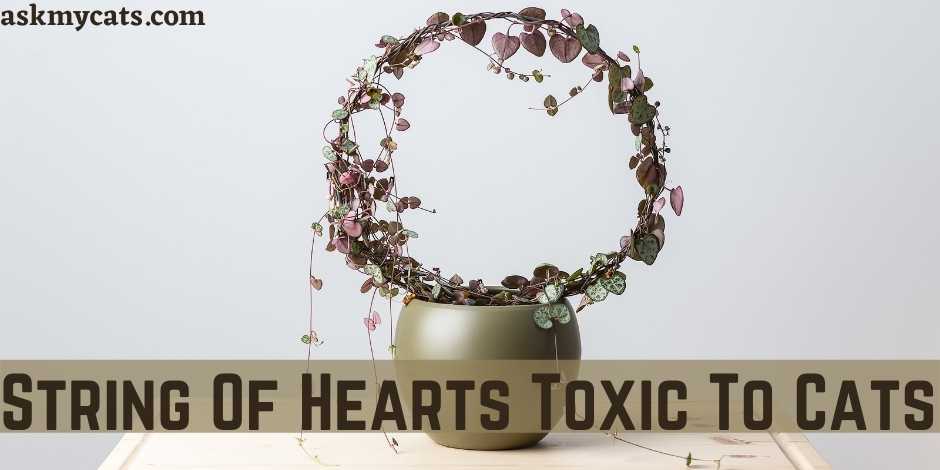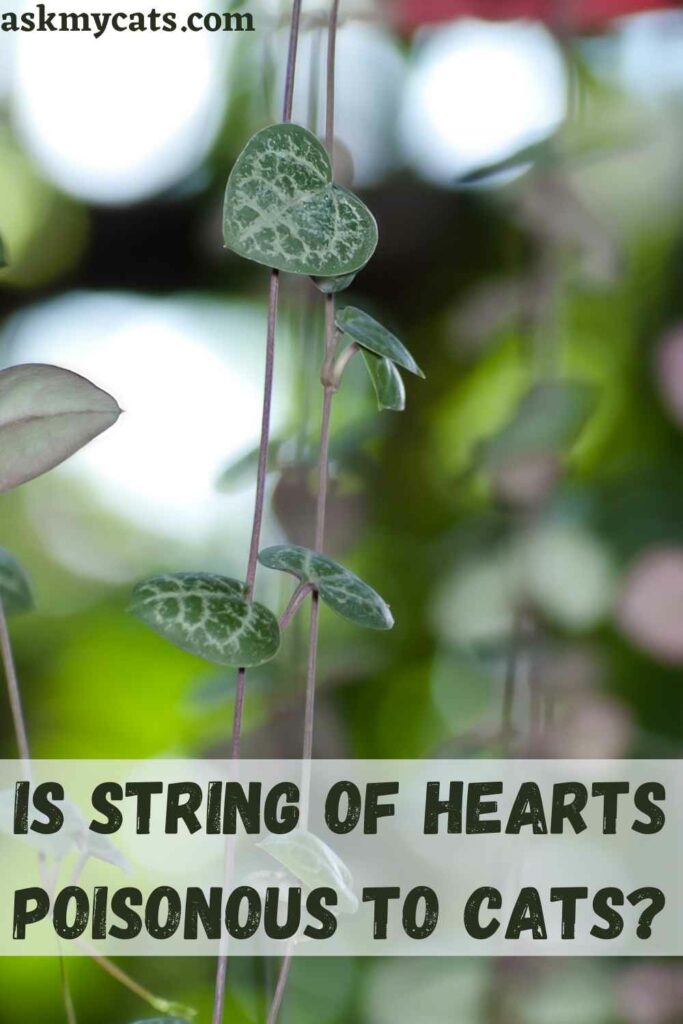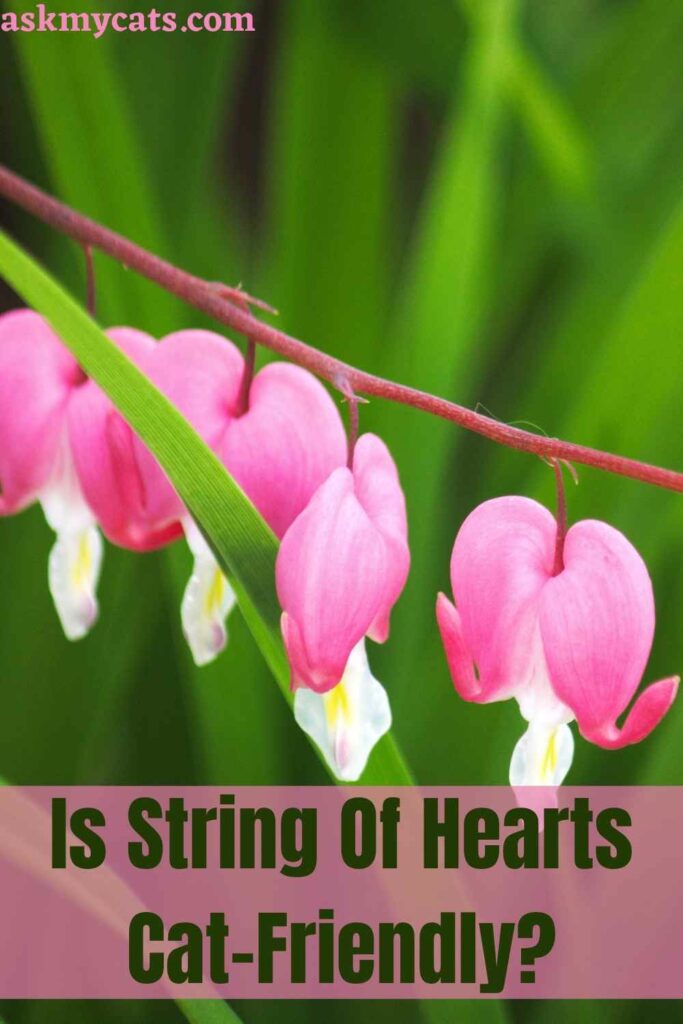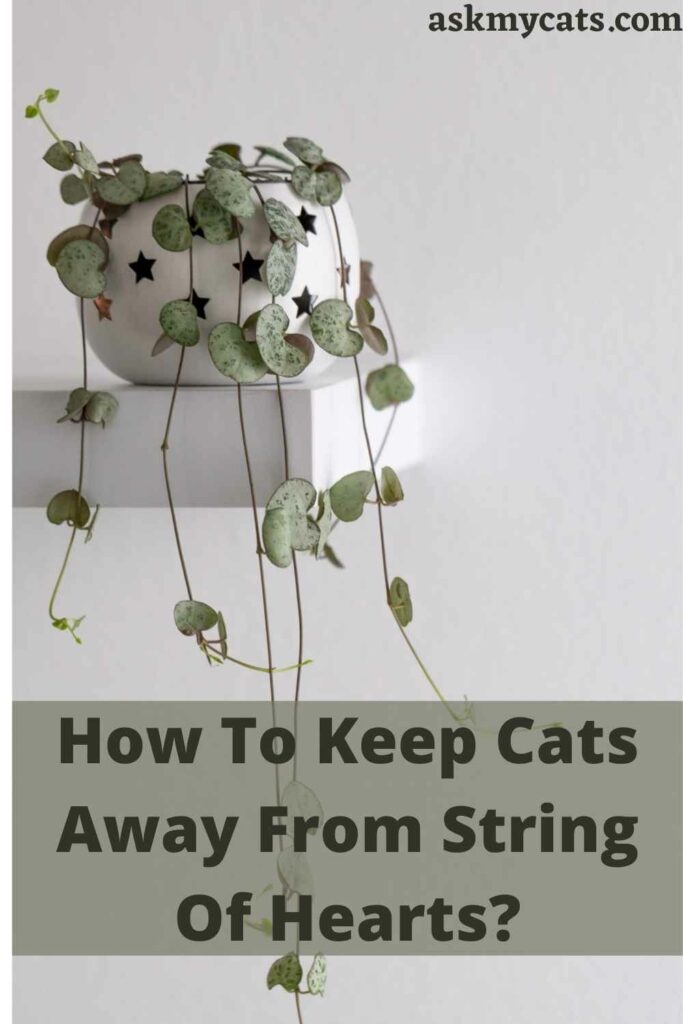Chain of hearts, collar of hearts, string of hearts, rosary vine, hearts-on-a-string, and sweetheart vine are some of the common names for Ceropegia woodii. It’s an easy-care plant with lovely trailing leaves that’s native to Africa. It’s a rapid grower that will survive in a small container for years if given proper care.
However, is string of hearts toxic to cats?
No, string of hearts is not toxic to cats. Cats, dogs, and other pets, as well as humans, are safe around the string of hearts plant. Keep in mind that cats are likely to find those long, stringy stems attractive! To avoid trouble, hang/place your sting of hearts well away from them.
This article will talk about the relationship between your cat and string of hearts.


Give Your Cat the Perfect Day
Get the Free Ebook!
What Is String Of Hearts?
The String of Hearts is a sweet and fantastic hanging plant native to South Africa, Swaziland, and Zimbabwe.
Ceropegia woodii, often known as String of Heart, is a lovely trailing succulent to add to any living environment. While they may appear tough to care for at first, String of Hearts Succulents is one of the most patient houseplants once you get the hang of it.
The sweet and magnificent hanging plant native to South Africa, Swaziland, and Zimbabwe, the String of Hearts is a delicious and fantastic hanging plant.
This gorgeous succulent has captured the hearts of many collectors due to its dark green leaves with variegated silver markings or cream, pink, and green heart-shaped, patterned leaves.
It can grow up to 3 inches tall and has purple-toned stems that may reach 3 to 9 feet long, so hang it somewhere high so you can see how beautiful it can be, especially when it starts to cascade out of the pot like a waterfall.
Furthermore, as with other succulents, too much sunlight can scorch the leaves of String of Hearts (browning or crispy leaves, dry leaf-edges, stunted growth), while too little sunlight can result in discoloration or overwatering.
So, if you’re going to grow yours outside, make sure it gets at least 3 to 4 hours of bright, indirect sunshine each day, as well as some afternoon shade.
Also, to avoid sunburn, gradually adapt this plant to greater light when moving it from indoors to outdoors throughout the summer.
Although it produces tiny purple flowers, most people retain this plant for its lovely leaves. These are adorable little heart-string plants that can be hung, placed on a shelf, or used as a pot plant to create instant impact.
Is String Of Hearts Poisonous To Cats?
No, string of hearts is not poisonous to cats.

The String of Hearts features delicate deep magenta flowers that can be grown indoors year after year.
From spring until fall, you may help your plant bloom by giving it regular care and fertilizing it.
Cats, dogs, other pets, and humans are all safe around the string of hearts plant.
Keep in mind that cats are likely to find those long, stringy stems attractive!
To avoid difficulty, hang/place your Ceropegia woodii well away from them.
The Peperomia family as a whole is deemed non-toxic. You’ll want to collect them all because there are so many cute kinds to display on your windowsill, desk, or table.
Ceropegia woodii, sometimes known as String of Hearts, is one of many Ceropegia species that are planted as houseplants.
Due to its ease of maintenance and striking appearance in any setting, string of hearts is one of several palm species that have grown popular as houseplants.
If you have a cat and one of these lovely plants in your home, you’ve probably wondered if majesty palm is safe for cats.
Because the string of hearts tree is free of any dangerous or irritating substances, your cat will not be hurt by eating, scratching on, or doing anything else cats do around it. According to the USDA, the string of hearts is safe for both cats and people.
So even if your cat eats your heartstring to a skeleton, the only thing that will be harmed is the attractiveness of your plant.
String of hearts does not hurt cats, dogs, or horses because it is not toxic, poisonous, or harmful to animals. It is, in fact, one of the safe indoor palms for cats, joining the ranks of Kimberly queen and bird’s nest ferns, fittonia, and rabbit cactus, among others.
While the leaves are not toxic, if your cat eats a lot of them, it may create gastric problems. These species, on the other hand, usually only eat a small amount of plants. As a result, if you observe your cat eating it, don’t be alarmed.
According to the American Society for the Prevention of Cruelty to Animals, string of hearts is completely non-toxic to cats.
That means none of the plant’s parts, such as the leaves, stems, trunk, or roots, contain any compounds that could harm your cat.
So, if your cat can’t get enough of your plant, you don’t have to worry about its health.
Is String Of Hearts Cat-Friendly?
Yes, string of hearts is cat-friendly.

String of hearts poisons no cat species. Cats, on the other hand, are rash when it comes to climbing trees.
It’s also possible that the leaves and thrones will be ripped to shreds.
In this situation, cats are safe since the string of hearts does not release any toxic substances.
Ingesting the leaves, on the other hand, may cause health concerns. Cats are unaffected by string of hearts because they are non-toxic.
The string of hearts is one of the plant species that has been shown to be safe for both cats and humans.
You can keep them at home to contribute to the space’s visual appeal. You can also incorporate it into your family’s garden at the same time.
String of hearts is not poisonous to cats. Your string of hearts, on the other hand, maybe harmed by cats. String of cats, unlike aloe vera, do not contain any toxic compounds.
The leaves of the string of hearts will be no difficulty for your cat to nibble on. Furthermore, your cat may rip the leaves off, causing them to be ruined.
Although your cat is unlikely to be injured by the string of hearts, it is possible that your cat will grow hostile in its presence. Cats are impulsive animals. Its claws have the potential to rip the leaves and scratch the tree.
Is String Of Nickels Toxic To Cats?
It is still unknown whether string of nickels is toxic to cat or not as studies as being conducted in the present.
If you’re looking for a String of Nickels Toxic to Cats or Other Pets, first know that Dischidia nummularia is a popular and distinctive house plant that’s very easy to care for, and if you have a dog or cat, you might be curious what happens if you accidentally eat a mouthful of those coin-shaped leaves.
Is String of Nickels Toxic to Cats? It’s still unknown if String of Nickels Toxic to Cats has any effect on pets or if it’s harmful.
There is no study to back up its toxicity, which is why we don’t make any claims unless a study is published on a government website or a research institute does one.
String of nickels is a genus in the Apocynaceae family. It was said that species in this family have some sort of toxicity in some plants like cascabela, Nerium, and thevetia, but there is no information regarding string of nickels, so we don’t know if it’s toxic or not.
Is String Of Pearls Toxic To Cats?
Yes, string of pearls is slightly toxic to cats.
String of pearls has toxicity classifications 2 and 4 in humans, according to the University of California, Davis. Ingestion of string of pearls may induce minor disease such as vomiting or diarrhea, which is classified as Class 2.
Contact with the plant’s juice or sap can produce skin irritation or a rash, which is classified as class 4. If your child eats a string of pearls, contact the Poison Control Center or your pediatrician right away.
Drooling, diarrhea, vomiting, and lethargy are all possible signs of ingestion of the string of pearls plant in pets, including cats and dogs.
Some people may have skin or oral irritation as a result of contact. If you think your pet has eaten this plant, call your veterinarian right away.
How To Keep Cats Away From String Of Hearts?
You can keep cats away from string of hearts by: –

Hearts of strings are a wonderful addition to any home because they bring color, intrigue, and, most importantly, oxygen.
Cats, on the other hand, appear to like our heart of strings just as much as we do, but for the wrong reasons.
Cats chew on the heart of strings, destroying the foliage, using them as litter boxes, or playing with them until the leaves fall off.
This makes the growing heart of strings and enjoying your feline buddies difficult.
There’s no reason for many cat owners to abandon their attempts to grow indoor plants.
Fortunately, there are techniques to protect plants from cats, so you don’t have to give up your greenery or your feline companions.
Here are some tips that will keep your cats away from your string of hearts plant: –
You can make your plant cat-proof by making them stink. If you sprinkle cayenne pepper over the leaves of your houseplants, your cat will swiftly flee. Citrus is also repulsive to cats. To help repel them, put orange and lemon peels in your pots alongside the plants. Spraying the leaves directly with diluted lemon juice or orange oil is another approach. Citrus oil extracts are hazardous to cats and should be avoided in insecticidal sprays, dips, shampoos, insect repellents, food additives, and scents.
To avoid digging, cover the soil with some large pebbles or stones at the base of the plants. Placing pinecones or aluminum foil around the planter, for example, may deter cats. Covering the plant’s base with chicken wire, mesh, or similar permeable fabric is another alternative.
Dangling plants are often the victim of cats pawing and batting long strings like string of hearts or string of pearls. Keep them trimmed and less enticing to those sharp kitty claws.
Keep your string of hearts planted on pedestals with not a whole lot of surface area to land on. If they can’t fit, they can’t sit.
To keep cats out, create a plant room and keep the door closed. Sunrooms are ideal, but sunny bedrooms or baths will suffice.
Use wire shelving units to encase the plants. This will help safeguard the plants, but the most daring cats may still find a way to get their paws in.
In addition to focusing on indoor plants that cats avoid, why not give some safe plants as a form of sacrifice? Catnip and lemon balm are favorites of felines. Place a few in unbreakable plastic pots and scatter sacrifice plants about the home, but not exactly next to your other plants. This will keep your obnoxious kitty engaged and may save some of your other plants from destruction.
Frequently Asked Questions
What are the cat-safe alternatives of string of hearts?
Hens and Chickens. Hen and chickens (hen and chicks for short) are among the most popular succulents, and with good reason. They are well-known for being low-maintenance and flourish in a variety of settings, including planters, rock gardens, and succulent wreaths. The main plant, known as the “hen,” is linked to the smaller offshoots (her “chicks”) via thin, fragile roots, creating an aesthetically pleasing display and it is non-toxic to cats. Another alternative of string of hearts could be Haworthia. If you like the spiked silhouette of aloe vera, try a haworthia instead. This easy-to-grow succulent, often known as the zebra cactus, has a similar appearance but is not harmful to cats.
How to propagate string of hearts?
The chain of hearts is quite simple to propagate. Simply cut a length of around 3cm, remove the bottom set of leaves, and replant the root end with the mother plant. They do contain nodes but feel free to remove a few leaves to make sure. They can be propagated in water, but they root so easily in soil. The most difficult part of propagating Chain of Hearts is remembering which ends to place in the soil because only the cut end will root. Because they reproduce so quickly, they can be a nuisance in the wild.
Is string of hearts a succulent?
Yes, string of hearts is a succulent. String of Hearts (Ceropegia woodii) is a succulent-like trailing plant native to South Africa. In its natural habitat, the delicate heart-shaped leaf and slender vines can reach up to 12′ long, earning this plant several titles such as Rosary Vine and Sweetheart Vine.
Final Words
The string of heart is an attractive addition to your home that is simple to maintain and has an immediate impact. If your cat enjoys chewing on it or is merely curious, a string of hearts plant will not harm them in the least.
If you have any questions, ask us in the comments section.
